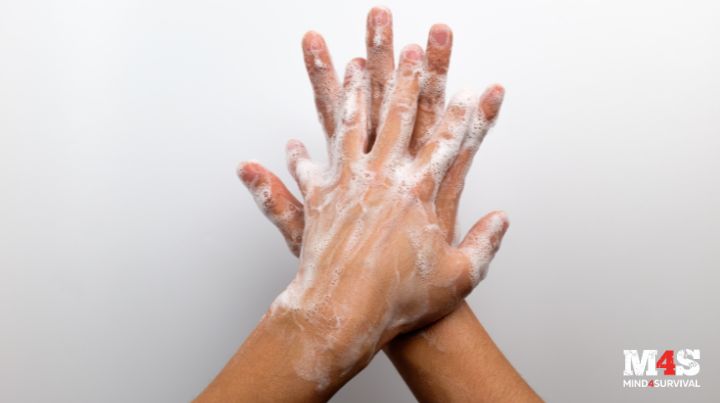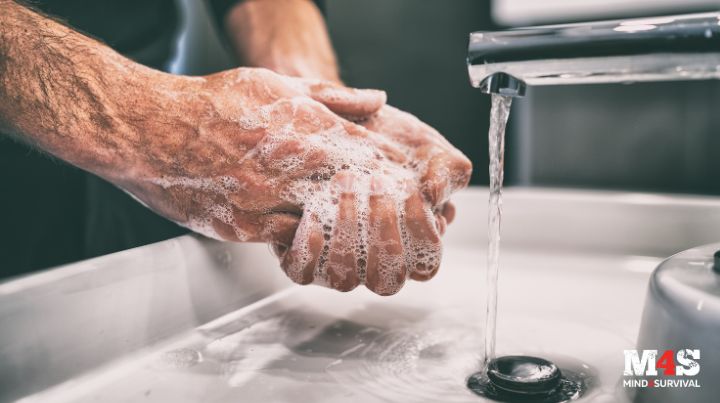Emergencies bring chaos—and germs. Whether it’s a natural disaster, a power outage, or a routine day at home, proper handwashing is a simple yet powerful tool to keep you and your family safe and healthy. So, how can you step up your hand hygiene game? Let’s learn to wash our hands like surgeons because clean hands save lives.
Quick Look at What You’ll Learn
Why Handwashing Matters
Handwashing isn’t just about feeling clean. As a former paramedic who scrubbed in for several surgeries, I know firsthand that it’s about breaking the chain of infection. Dirty hands can spread respiratory illnesses, stomach bugs, and more. In fact, the CDC notes that proper handwashing reduces the risk of diarrhea-related diseases by up to 40%. Now, imagine the stakes during a grid-down scenario, where medical care might be limited.
Without clean hands, minor cuts can lead to infections, and a simple stomach bug can escalate into something life-threatening. Washing your hands thoroughly and often is one of the easiest ways to protect yourself and others. It’s not just about personal hygiene—it’s a critical aspect of community health.
The Surgeon’s Handwashing Routine
I learned from surgeons who rely on clean hands to save lives and offer a gold standard for hygiene. Here’s their step-by-step guide, adjusted for everyday use.
Step 1: Start with a Clean Slate
Remove rings, watches, and anything else that can trap germs. Germs hide in the nooks and crannies of jewelry, so don’t give them a free ride.
Step 2: Find the Right Temperature
Use warm water—comfortably warm, not scalding. It’s gentle on your skin but unfriendly to bacteria.
Step 3: Soap Up
Apply soap liberally. Liquid soap works best, but bar soap is fine, too. The goal? Work up a frothy lather that covers every inch of your hands.
Step 4: Scrub Every Corner
No surface should go untouched. Pay attention to:
- Palms and the backs of your hands
- Between your fingers
- Under your nails
Tip: Keep fingernails trimmed short for easier cleaning.
Step 5: Count to 20
Scrub each area of your hands for at least 20 seconds—long enough to hum “Happy Birthday” twice. This ensures you’ve removed harmful germs.
Step 6: Rinse Completely
Let the water run from your wrists to your fingertips, washing germs down the drain. Avoid splashing as much as possible.
Step 7: Dry Thoroughly
Use a clean towel or air dryer. Damp hands invite germs back, so don’t skip this step.
Handwashing in Emergency Situations
Access to soap and water may be limited in emergencies, but there are ways to help maintain hygiene even in challenging conditions. Remember, these aren’t perfect. Instead, they are less-than-ideal options to help you do your best in a crummy situation.
Use Alternative Soaps
If soap isn’t available, ash or sand can work as a field expedient substitute. While not ideal, these materials have been used for centuries to scrub dirt and germs. Rub them over your hands with a bit of water to create friction to kill germs, then rinse thoroughly.
Prioritize Clean Water
When water is scarce, every drop counts. Use stored water, but if none is available, purify it with tablets, boiling, or filters before washing. Even small amounts of purified water can make a difference.
Hand Sanitizers Help
Alcohol-based hand sanitizers are a lifesaver when soap and water aren’t an option. Choose a sanitizer with at least 60% alcohol. Apply enough to cover your hands entirely and rub them together until dry. While sanitizers don’t eliminate all types of germs, they’re a strong alternative when the chips are down and you’re out of other options.
Carry Supplies in Your Emergency Kit
Add travel-sized soap, hand sanitizer, and clean towels to your emergency preparedness kit. These small items can have a significant impact when maintaining hygiene is critical.
The Science of Handwashing
Why does soap work so well against germs? It all comes down to chemistry. Soap molecules have one end that clings to water and another that binds to oils and dirt. This dual action lifts germs off your skin and suspends them in the water, making it easy to rinse them away.
This simple chemical reaction could mean the difference between staying healthy and getting sick in emergencies.

Handwashing Myths: Busted
- Myth: Hot water kills more germs.
- Truth: Water that’s too hot can damage skin, making it more vulnerable to germs. Warm water is sufficient.
- Myth: Bar soap is unsanitary.
- Truth: Germs don’t stick to soap. Rinse your bar soap before and after use for peace of mind.
- Myth: Quick rinses are enough.
- Truth: Without scrubbing and soap, germs remain. Proper technique is vital.
Hygiene Beyond Handwashing
Handwashing is critical, but it’s not the only hygiene habit to adopt during emergencies:
- Keep Surfaces Clean: Regularly disinfect high-touch areas like doorknobs, phones, and countertops.
- Avoid Touching Your Face: Germs spread quickly when you touch your eyes, nose, or mouth.
- Practice Cough Etiquette: Use a tissue or your elbow to cover coughs and sneezes. Dispose of tissues immediately and wash your hands.
Fun Fact: The Impact of Handwashing
Did you know? Effective handwashing reduces the spread of respiratory illnesses by up to 20%. This small habit packs a big punch in protecting your health. Imagine how many colds, cases of the flu, or stomach bugs you could avoid just by scrubbing for 20 seconds.
The Bottom Line on Handwashing
Are your handwashing skills up to par? Practice these steps and teach them to your family. Hygiene starts with small habits that make a huge difference in emergencies and everyday life.
Even when the power is out, or water is scarce, maintaining hygiene is possible with creativity and a little planning. By prioritizing handwashing and related habits, you’re not just protecting yourself—you’re helping create a healthier environment for everyone around you.
What’s your go-to handwashing tip? Share it below!
Additional Resources:
Stay safe,

Read the full article here


